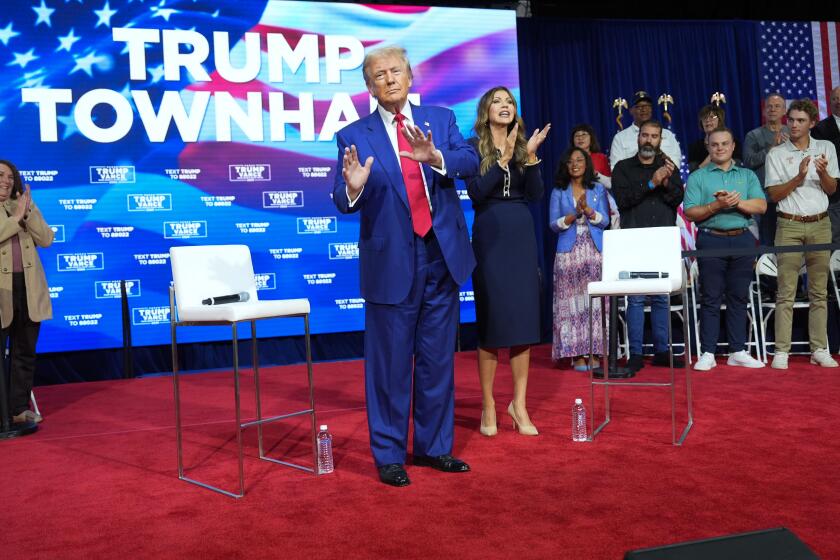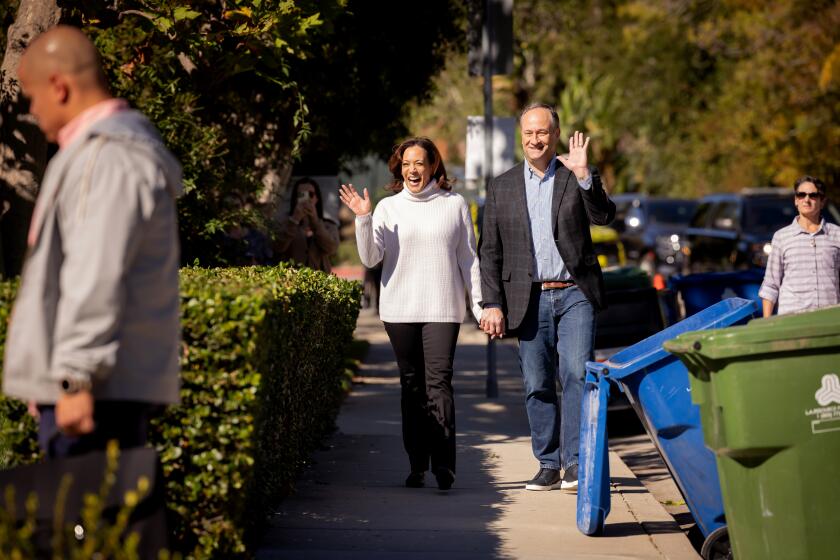GOP, Democrats Adjust Old Economic Positions, Develop New Ones : Stock Crash Forcing Candidates to Reshape Strategies
“I’ve been a co-pilot for seven years,” Vice President George Bush said in his concluding statement at the recent GOP presidential debate. “And I know how to land a plane in a storm.”
That figure of speech was striking, coming as it did from the junior partner to a President who has invariably talked about economic takeoffs, not descents. Bush’s move toward a bleaker assessment of the national condition reflects trepidations widely shared by other White House aspirants in both parties.
And it signals a dramatic transformation in the strategic outlook for the 1988 presidential campaign. This change is directly attributable to what most analysts now regard as the most portentous event so far in the campaign--last month’s record plunge in stock prices.
Situation in State of Flux
The situation in both parties remains in a state of flux as the turmoil in the financial markets continues. But already it is clear that a new and more serious political reality is emerging, one that forces candidates to adjust old positions and develop new ones under conditions of intense public scrutiny.
To fully appreciate the change, it helps to recall the economic circumstances governing the campaigns in each party before Wall Street’s Black and Blue Monday.
--Republicans: With unemployment dropping and inflation still relatively low, GOP contenders generally viewed the economy as their prime asset. They argued among themselves over who had the best claim to being heir to President Reagan’s economic policies.
--Democrats: Some candidates predicted dire economic consequences from the huge budget and trade deficits. But, for the most part, their campaigns seemed to focus on the character traits of their rivals and on sometimes esoteric differences over nuclear arms.
Both Parties Shifting
Now the Republican candidates are suddenly concentrating on developing solutions to the Reagan Administration’s legacy of economic problems, and the Democrats are bolder in condemning Reagan’s economic policies even if most are slow to offer specific alternatives of their own.
David Keene, senior policy consultant to Kansas Sen. Bob Dole, chief rival to Republican front-runner Bush, sees “a significant change in the psychology of the campaign,” marked by “an increased level of apprehension.” From now on, Keene predicted, “voters are going to look much more closely at the policy choices offered by the candidates.”
Dole, who more than any other Republican candidate had previously called attention to the risks of running enormous budget deficits, has now made reducing the deficit an imperative.
“I don’t think we understand the urgency of the problem,” he warned during the same Republican debate in which co-pilot Bush promised a safe landing. “We’d better get with it.”
‘Blue Chips to Cow Chips’
Former Secretary of State Alexander M. Haig Jr., looking back on the October crash, said: “We watched blue chips turn into cow chips.” He added: “This campaign is changing importantly. This means we cannot conduct politics as usual.”
And even New York Rep. Jack Kemp, who has played down the importance of the budget deficit, acknowledged: “I am convinced that we’re entering an age in which we have some stark choices.”
On the Democratic side, as might be expected, the language has been harsher.
“This wasn’t simply a correction in the stock market; it was an earthquake,” declared Massachusetts Gov. Michael S. Dukakis.
Tennessee Sen. Albert Gore Jr. bemoaned “this crisis of confidence in our economy.”
And former Arizona Gov. Bruce Babbitt was characteristically blunt. “The fundamentals if we are honest are these,” he declared on Oct. 19, when the Dow Jones industrial average plunged 508 points. “We must cut spending and raise taxes.”
Quick With Judgments
With few exceptions--notably Babbitt, who is commended for his forthrightness even by critics of his proposals--candidates in both parties have been quicker to issue rhetorical judgments than to devise explicit solutions.
One explanation can be found in public opinion polls indicating that voters do not yet regard the stock market crash as having far-reaching impact on the economy and on their own lives. Democratic pollster Mark Mellman, as yet unaffiliated with any presidential candidate, said results from one survey found “no difference” in voter evaluations of the economy after the Oct. 19 crash, as compared to shortly before it.
But the same survey, Mellman said, found “substantial concern” about the health of the economy even before the crash, and he believes that the concern will ultimately grow.
In the Times Poll conducted from Oct. 29 to Nov. 2, 18% of those interviewed cited a further fall in stock prices as the gravest danger to the economy, and another 18% cited the budget deficit as the most serious threat, compared to 23% who named unemployment.
Remedies Found Unpopular
Still, political strategists reading the results of the poll and other surveys find little support for either raising taxes or cutting spending, the remedies mentioned most often in public debate as potential cures for the deficit and the stock market’s current affliction.
At the same time, economists disagree as to whether these remedies will work, or whether they will trigger a recession, thus adding to the mood of uncertainty.
Nevertheless, “This is something the candidates have to respond to,” said GOP pollster Linda DiVall, a neutral in the presidential race. “I don’t think they have the luxury of waiting and seeing what happens.”
In some respects, Bush’s position is the most difficult of any of the candidates because he has the least room to maneuver. He has pledged, as a candidate, to reject any tax increase and yet has agreed, as vice president, to support one if Reagan accepts a tax hike as part of a deficit-cutting package. Members of Congress and Administration officials are now trying to negotiate such a package.
Many believe that Dole is best situated of all Republicans to benefit from the changed environment. He is on record as having warned against the budget deficit, and, as Senate Republican leader, he is involved in the budget discussions with the Administration.
Ad Campaign Weighed
One Dole strategist talks half-seriously of making a campaign commercial showing Dole at work with other legislators trying to cut the deficit. “The idea,” he explained, “would be to show who isn’t there--Bush.”
Despite his earlier downplaying of the deficit problem, Kemp is riding a wave of favorable public attention, his press secretary John Buckley claims. The reasons, Buckley contends, are Kemp’s understanding of economics and his emphasis on stable international currency values, which many economists believe are at least as important as cutting the budget deficit.
As for the other GOP candidates, former Delaware Gov. Pierre S. (Pete) du Pont IV and former television evangelist Pat Robertson have a chance to benefit if voters become dissatisfied with the way financial and political leaders are handling the economy. Haig’s experience as a White House chief of staff and secretary of state is an asset, but he needs more credibility as a candidate to take advantage of it.
Among the Democrats, long-shot Babbitt continued to live up to his reputation for specificity by proposing a $40-billion-a-year package to cut the deficit. Half would come in revenues from a 2.5% national consumption tax and the rest in spending cuts, evenly split between defense and domestic programs, including Social Security.
Missouri Rep. Richard A. Gephardt, who has been taking increasing criticism for his get-tough stand against nations with large trade surpluses with the United States, is sticking to his guns on that issue. Meanwhile, he called for the appointment of former Federal Reserve Board Chairman Paul A. Volcker as coordinator of Administration economic policy.
His own deficit-reduction package of $30 billion to $40 billion a year includes imposing an oil import fee, closing tax loopholes and collecting about $7 billion in back taxes.
Illinois Sen. Paul Simon, bidding for support of traditional liberals, says he is depending mainly on the negotiations between Congress and the White House to deal with the deficit. Simon thinks the goal of these talks should be $35 billion a year, but beyond mentioning a cigarette tax increase and an oil import fee as possibilities, he has offered few specifics.
Dukakis, who likened the Oct. 19 crash to “our national alarm clock going off loud and clear,” promised to “talk turkey about new revenue” and said that no candidate should flatly rule out new taxes. But he offered no such proposal himself and instead reiterated his call for tightening tax enforcement, an idea that critics doubt would raise nearly as much money as Dukakis claims.
The governor is scheduled to speak out on economic issues again this week, and advisers indicated that he may have something fresher to offer.
‘Economic Camp David’
The Rev. Jesse Jackson, along with repeating his previous appeals for cutting military spending and making the rich and corporations pay “their fair share of taxes,” called for “an economic Camp David” to find a way out of the current predicament. Included, he said, should be “a wide range of Americans”--business executives, labor leaders and elected officials.
In his first major pronouncement on the financial crisis, Gore recalled the words and deeds of President Franklin D. Roosevelt in overcoming the Great Depression. He then called for a domestic summit conference to deal with the current turmoil and urged greater economic cooperation with U.S allies.
Some think that Gore is well positioned to take advantage of the economic upheaval because he is not closely tied to past party dogmas. But he has yet to offer the specific proposals needed to take advantage of that flexibility.
More to Read
Get the L.A. Times Politics newsletter
Deeply reported insights into legislation, politics and policy from Sacramento, Washington and beyond. In your inbox three times per week.
You may occasionally receive promotional content from the Los Angeles Times.










